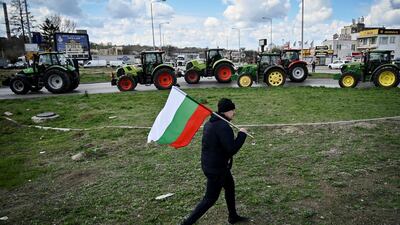Tariffs on Ukrainian agricultural imports may need to be reintroduced if an influx of products that is pushing down prices in EU markets cannot be stopped by other means, the prime ministers of five Eastern European states said on Friday.
In a letter to European Commission President Ursula von der Leyen published on a Polish government website, the prime ministers of Poland, Hungary, Romania, Bulgaria and Slovakia said that the scale of the increase of products including grain, oilseed, eggs, poultry and sugar had been "unprecedented".
The EU set up a mechanism to assist Ukrainian grain exports after Russia invaded the country in February last year. This has enabled Kyiv to export 25 million tonnes by land using “solidarity lanes”.
But logistical bottlenecks mean large quantities of Ukrainian grains, which are cheaper than those produced in the EU, have ended up in eastern and central European states, hitting prices and sales of local farmers.
While most EU countries strongly support to Ukraine’s war effort, issues such as this — affecting countries already hit by high inflation — highlight the continent’s struggle to adjust to the war’s fallout.
In the letter, the prime ministers called for a variety of measures to limit market distortions caused by Ukrainian imports, but said that if these were not successful tariffs and tariff quotas should be reintroduced.
"Let's support Ukraine, but let's do it wisely and, above all, let's put the interest of the country and Polish farmers in the first place," Polish Prime Minister Mateusz Morawiecki said on Twitter.
The EU Commission on Thursday unlocked €56.3 million ($61.2 million) in compensation for Bulgarian, Polish and Romanian farmers.
But Friday's letter made it clear that Ukraine's neighbours believe that the reinstatement of protectionist measures may also be necessary.
Among the measures proposed in the letter was a joint solution between the EU and the World Food Programme to ensure Ukrainian grain does not end up in EU markets.
The prime ministers reiterated calls for more funds to help farmers and for faster development of transport infrastructure to help with the transport of goods from Ukraine.
They also called for changes to laws on agricultural imports that would help regulate the volume and direction of the inflow of agricultural products.
The influx of Ukrainian goods has caused protests in neighbouring countries and worry among political leaders that farmers will express their discontent in the ballot box.
Angry farmers are demanding the resignation of Poland's Agriculture Minister Henryk Kowalczyk, fuelling fears among the ruling Law and Justice Party that the issue will affect support in parliamentary elections later this year.
The nationalist party's conservative voter base mainly lives in rural areas and small towns.
In Bulgaria, grain producers have demanded that their country be excluded from the extension of the EU regulation waiving import duties for farm products originating in Ukraine, Dimitar Yaprakov, spokesperson for Bulgaria’s representation to the EU, told The National.
A Romanian farmer told the Financial Times this week that farmers cannot sell this year’s harvest because of Ukrainian grain flooding the local market.
One problem is that Ukrainian grain that is supposed to transit through neighbouring countries is bought and sold locally by companies trying to make a profit from its relatively cheaper price, sources said.


